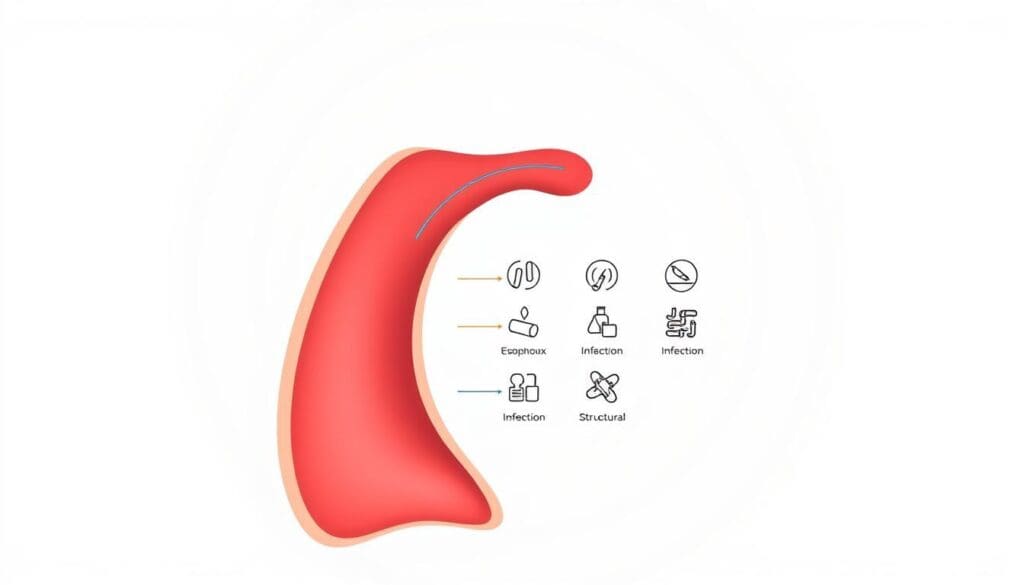
What are the common causes of chronic throat pain? Learn about non-infectious causes like LPR (reflux), allergies, and chronic post-nasal drip.
If you’re dealing with a sore throat that won’t go away, you’re not alone. Chronic throat pain, or chronic pharyngitis, affects many people around the world.
The Medical organization says chronic pharyngitis is a sore throat that lasts more than 10 days or keeps coming back. It can make simple tasks hard and uncomfortable.
At Liv Hospital, we take chronic throat pain seriously. We focus on you, not just your symptoms. Our goal is to give you the best care possible.

Chronic pharyngitis, or persistent throat pain, is a long-term condition. It makes everyday tasks like swallowing and speaking hard. This can really affect someone’s life.
Chronic pharyngitis is a sore throat that lasts for weeks or months. Virginia ENT says it’s caused by infections, allergies, and environmental irritants.
Key characteristics of chronic pharyngitis include:
Doctors say chronic pharyngitis is more than just a sore throat. It needs a detailed approach to diagnose and treat.
“The diagnosis of chronic pharyngitis involves understanding the underlying causes, which can range from gastroesophageal reflux disease (GERD) to environmental factors like air pollution.”
Persistent throat pain is common among those who see doctors. Conditions like chronic tonsillopharyngitis and GERD are often the cause.
Many people deal with recurring or persistent throat pain. This affects their daily life, health, and productivity. It’s important to manage it well.
Knowing the causes and how common it is helps us improve treatment. This can lead to better health outcomes for patients.

Understanding what causes chronic throat pain is key to feeling better. This pain can come from infections, allergies, and our environment.
The main reasons for chronic throat pain include chronic tonsillopharyngitis, gastroesophageal reflux disorder (GERD), laryngopharyngeal reflux (LPR), and submandibular sialadenitis. The Medical organization says infections, allergies, and the environment are big triggers.
Infections can make the throat inflamed for a long time. Allergies can make you feel like you have a drip in your throat. Things like pollution or dry air can also hurt your throat.
Chronic throat pain shows up in different ways, depending on the cause. For example, GERD and LPR can make you feel like there’s a lump in your throat or burning. This pain is often worse in the morning because of nighttime acid.
Knowing how these different causes show up is important for finding and treating the real problem of chronic throat pain.
Throat pain can come from viral and bacterial infections. These can cause sore throats and chronic conditions like tonsillopharyngitis.
Viral infections often cause sore throats. The common cold and flu irritate the throat, leading to pain. COVID-19 also causes sore throats, along with other symptoms. These viruses usually get better on their own but can hurt your throat.
The common cold is caused by viruses like rhinoviruses and coronaviruses. The flu is caused by the influenza virus. Knowing the cause helps in managing it.
Strep throat is a bacterial infection caused by group A Streptococcus. It needs antibiotics to prevent serious problems. Symptoms include severe throat pain, fever, and swollen lymph nodes.
To diagnose strep throat, doctors use rapid tests or throat cultures. Antibiotics can help symptoms and prevent serious issues like kidney problems or rheumatic fever.
Chronic tonsillopharyngitis is ongoing inflammation of the tonsils and pharynx. It can come from repeated infections. It causes long-lasting throat pain and may need a detailed treatment plan.
Managing chronic tonsillopharyngitis involves good hygiene, staying hydrated, and avoiding irritants. Sometimes, tonsillectomy is considered for those with frequent tonsillitis.
Chronic throat pain often comes from acid reflux disorders like GERD and LPR. Acid reflux happens when stomach acid flows up into the esophagus or throat. This can cause burning and discomfort. We’ll look at how these issues affect the throat and what treatments are available.
GERD is a common reason for chronic sore throat. It happens when stomach acid flows back into the esophagus. This can irritate the esophagus and throat, causing pain and discomfort. Symptoms include heartburn, regurgitation, and trouble swallowing. Virginia ENT says GERD is a big cause of chronic throat pain.
LPR is a type of GERD that affects the throat. In LPR, stomach acid reaches the laryngopharyngeal area, causing irritation and inflammation. Symptoms can be hoarseness, a feeling of a lump in the throat, and chronic cough. LPR is harder to diagnose than GERD because its symptoms are less typical.
Nighttime reflux is a big problem for people with acid reflux. It can cause morning throat pain and discomfort. Keeping the head of the bed elevated and avoiding eating close to bedtime can help with nighttime reflux. Understanding nighttime reflux is key to managing morning throat pain.
To understand the differences between GERD and LPR, let’s look at their key characteristics in the table below:
Characteristics | GERD | LPR |
Primary Area Affected | Esophagus | Laryngopharyngeal Area |
Common Symptoms | Heartburn, Regurgitation | Hoarseness, Lump in Throat |
Diagnostic Challenges | Typically diagnosed based on heartburn symptoms | Can be challenging due to atypical symptoms |
Postnasal drip is often linked to allergies and sinusitis. It causes throat discomfort. When the nasal passages make too much mucus, it drips down the throat, irritating it.
Allergies are a common cause of postnasal drip. Seasonal allergens like pollen can make your nose stuffy and increase mucus. Perennial allergens like dust mites and pet dander also cause nasal irritation and drip.
The Medical organization says allergies can lead to postnasal drip and sore throats. To manage allergies, avoid allergens, use air purifiers, and take medication.
Postnasal drip happens when the nasal passages make too much mucus. This mucus can be thick and hard to clear. It drips down the throat, causing irritation and pain.
“The presence of postnasal drip can significantly impact an individual’s quality of life, causing discomfort and disrupting daily activities.”
Chronic sinusitis can lead to complications like persistent postnasal drip and nasal polyps. The inflammation makes the nasal passages produce more mucus, worsening the drip.
Condition | Symptoms | Complications |
Allergies | Nasal congestion, sneezing, itchy eyes | Postnasal drip, chronic sore throat |
Sinusitis | Facial pain, nasal discharge, headache | Chronic sinus infections, nasal polyps |
Postnasal Drip | Throat irritation, cough, discomfort | Chronic throat pain, sore throat |
Understanding the link between allergies, sinusitis, and postnasal drip is key to managing chronic throat pain. By tackling the root causes, people can find relief from ongoing discomfort.
Our surroundings can greatly affect our throat health, causing ongoing discomfort. Many environmental factors lead to chronic throat pain. Knowing these can help us lessen their impact.
Air pollution is a big environmental factor that can irritate the throat. Both outdoor and indoor air quality are key to throat health. Pollutants like particulate matter, nitrogen dioxide, and sulfur dioxide can make throat irritation worse.
Key indoor air pollutants include:
To improve indoor air quality, clean regularly, use air purifiers, and ensure good ventilation.
Dry air, common in winter when heating systems are on, can dry out the throat. This leads to irritation and discomfort. Using humidifiers can keep indoor humidity at a healthy level, between 30-50%.
Benefits of humidifiers include:
Tobacco smoke is a known irritant causing chronic throat pain. Both smoking and being exposed to secondhand smoke can irritate the throat. This can also raise the risk of serious health problems.
Ways to reduce exposure include:
By understanding and tackling these environmental factors, we can greatly reduce chronic throat pain. This improves our overall throat health.
Our lifestyle affects our throat health. Things like how we use our voice and what we eat can cause pain. Factors like vocal strain, mouth breathing, and certain foods can lead to chronic throat issues.
People who use their voices a lot, like singers and teachers, often face vocal strain. This can happen from yelling, talking loudly, or speaking too much without a break. It strains the throat muscles, causing pain and discomfort.
The Medical organization says long-term vocal strain can cause chronic throat pain. To avoid this, professional voice users should learn good vocal techniques and take voice breaks regularly.
Mouth breathing, often during sleep, can dry out the throat and irritate it. This is linked to sleep disorders like sleep apnea. Changing how we sleep and addressing sleep issues can help reduce throat discomfort.
Eating spicy foods, acidic drinks, and other irritants can irritate the throat. Knowing and avoiding these can help manage chronic throat pain.
Dietary Irritant | Effect on Throat | Prevention Strategy |
Spicy Foods | Irritation and inflammation | Avoid or reduce consumption |
Acidic Beverages | Erosion of mucous membranes | Limit acidic drinks |
Caffeine | Dryness and irritation | Moderate caffeine intake |
Understanding and tackling these lifestyle factors can help a lot in reducing chronic throat discomfort.
There are medical causes of chronic throat pain that aren’t as well-known. These less common causes are important to consider for a correct diagnosis and treatment.
Submandibular sialadenitis is an inflammation of the submandibular gland. It can cause pain and swelling below the jaw, which might spread to the throat. Symptoms may include trouble swallowing, dry mouth, and pain when eating. Virginia ENT says this condition can be caused by infection or blockage.
Thyroid problems can also cause chronic throat pain. Both hypothyroidism and hyperthyroidism can lead to throat discomfort. An enlarged thyroid gland (goiter) can press on the throat, causing pain. Treatment of the underlying thyroid condition is key to relieving throat symptoms.
Certain autoimmune conditions can cause chronic throat pain. Conditions like Sjögren’s syndrome, rheumatoid arthritis, and lupus can affect the throat. Management of these conditions often requires a team effort from rheumatology and otolaryngology.
It’s important to understand these less common causes of chronic throat pain. Getting an accurate diagnosis and proper treatment can greatly improve your quality of life.
To find the cause of chronic throat pain, a detailed check is needed. This includes looking at medical history, doing a physical exam, and running tests. The Medical organization explains this process.
The first step is a detailed medical history and physical exam. We look at symptoms, medical history, and lifestyle. A thorough check of the throat, tonsils, and neck is key to spotting problems.
Key components of the initial evaluation include:
Based on the first check, we might suggest more tests. These tests help find the real cause of the pain.
Some of the specialized tests used include:
A doctor says, “Accurate diagnosis is the cornerstone of effective treatment for chronic throat pain.” This shows how important a detailed check is.
“The key to managing chronic throat pain lies in understanding its underlying cause, which can often be identified through a combination of clinical evaluation and diagnostic testing.”
In some cases, an endoscopy is needed. This lets us see the throat and larynx directly. It uses a flexible or rigid endoscope to look at the upper airway and digestive tract.
Endoscopy is considered when:
By using clinical checks and tests, we can find the cause of chronic throat pain. Then, we can make a good treatment plan.
Treatment for chronic throat pain involves many steps. This includes medicines, lifestyle changes, and sometimes surgery. The right treatment depends on finding the cause of the pain. Causes can be infections, allergies, acid reflux, or environmental factors.
Medicines are key in treating chronic throat pain. For infections like strep throat, antibiotics are used to kill the bacteria. Antihistamines help with allergy symptoms, like postnasal drip, which can bother the throat. Proton Pump Inhibitors (PPIs) treat acid reflux by lowering stomach acid, easing throat irritation.
For bacterial infections, doctors might prescribe antibiotics like amoxicillin or azithromycin. Antihistamines, such as loratadine or cetirizine, can help with allergy symptoms by reducing allergic reactions.
Making lifestyle changes is important for managing chronic throat pain. Avoiding irritants like tobacco smoke and spicy foods helps. Staying hydrated keeps the mucous membranes moist and helps clear irritants.
Good vocal hygiene, like avoiding loud talking, is also helpful. Managing acid reflux through diet and elevating the bed can help too. For those with allergies, reducing exposure to allergens and using air purifiers can lessen symptoms.
In some cases, surgical intervention is needed to treat chronic throat pain. For example, a tonsillectomy might be suggested for chronic tonsillitis. If acid reflux is severe and not helped by medicine, surgery like fundoplication could be an option.
Surgeons usually consider surgery after other treatments have failed and the condition affects daily life. It’s important to talk about the risks and benefits of surgery with a healthcare provider.
Chronic throat pain can really hurt. But, there are ways to feel better at home. Simple steps can help manage pain and keep your throat healthy.
Drinking water is key for a healthy throat. It keeps the mucous membranes moist. This reduces irritation and discomfort.
Using a humidifier adds moisture to the air. It’s great for dry places. The Medical organization says it helps with throat irritation.
Some foods and drinks can ease a sore throat. Warm liquids like tea or broth are very soothing. Here are some good choices:
Stay away from spicy or acidic foods. They can make throat pain worse.
Resting your voice is important for healing. Avoid loud talking, singing, or shouting. This reduces strain on your throat.
Practicing good vocal hygiene is also important. Speak at a comfortable pitch and avoid straining your voice. These steps can help with chronic throat pain.
By using these home remedies and self-care tips, you can manage chronic throat pain. This improves your overall quality of life.
Managing and preventing recurring throat pain requires a full approach. This includes making lifestyle changes, taking care of yourself, and getting medical help. Knowing what causes chronic sore throat helps you take action to feel better and avoid future problems.
To prevent chronic pharyngitis, experts at Virginia ENT suggest avoiding irritants and staying hydrated. Managing allergies is also key. Simple steps like good vocal care, avoiding spicy foods, and using humidifiers can help soothe your throat and lower the chance of pain coming back.
By adding these steps to your daily routine, you can better manage and prevent throat pain. This improves your throat health and overall life quality. Always talk to a healthcare professional for advice on chronic sore throat and finding the root cause.
Chronic pharyngitis is a long-term inflammation of the pharynx. It causes ongoing throat pain and discomfort.
Many people experience persistent throat pain at some point. It’s quite common.
Main causes include infections, allergies, environmental factors, and lifestyle choices.
Yes, acid reflux can irritate the throat with stomach acid. This leads to chronic pain.
Allergies can cause throat pain by leading to postnasal drip. This irritates the throat.
Environmental factors like air pollution and tobacco smoke irritate the throat. They can cause chronic pain.
Yes, factors like vocal strain and mouth breathing can cause throat pain. So can certain foods.
Less common causes include submandibular sialadenitis and thyroid disorders. Autoimmune conditions can also cause it.
Doctors use a combination of evaluation, physical exam, and tests like endoscopy to diagnose it.
Treatment includes medications, lifestyle changes, and surgery. It depends on the cause.
Home remedies include staying hydrated, using humidifiers, eating soothing foods, and resting your voice.
To prevent recurring pain, maintain good throat health. Practice proper vocal hygiene and avoid irritants.
Your sore throat could be due to chronic infections, allergies, acid reflux, or environmental factors.
Frequent sore throats can be caused by infections, allergies, and environmental irritants.
Manage chronic scratchy throat by identifying the cause and using remedies like hydration and humidification.
Recurrent sore throat can be caused by infections, allergies, or environmental factors. It varies by individual.
National Center for Biotechnology Information. (2025). Why Does My Throat Hurt Constantly Causes of. Retrieved from https://pmc.ncbi.nlm.nih.gov/articles/PMC6848475/
Subscribe to our e-newsletter to stay informed about the latest innovations in the world of health and exclusive offers!
WhatsApp us